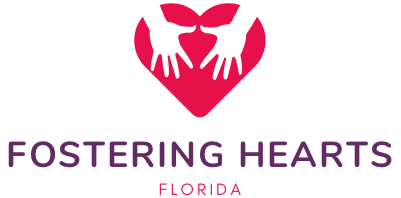Education, life skills, mentorship — support for kids in the foster care system and those aging out

Unlocking Potential, Changing Destinies
Fostering Hearts FL is a nonprofit organization dedicated to helping youth who are in the child welfare system and those who have aged out of foster care build a brighter future. We provide educational support, including classroom support, reading programs, GED preparation and online learning opportunities. We also are equipping young people with essential life skills, mentorship, and emotional guidance. By addressing the unique challenges faced after foster care—such as disrupted schooling, lack of stability, and limited resources—we empower these youth to gain confidence, achieve independence, and set themselves up for long-term success.
Foster children face hurdles most of us can’t imagine—sudden home changes, academic catch-up, and emotional healing from past traumas. Yet, they’re often overlooked and under-supported.
They need advocates, champions who see their potential and are committed to helping them thrive. That’s where we come in.
Through our educators, advocates, supplemental education programs and resources for future opportunities, we tailor education to fit each child’s unique journey.
Our aim? To provide more than just academic lessons. We offer mentorship, life skills, and a message loud and clear: foster children matter.
In collaborating with organizations like Friends of Joshua House, we’ve initiated programs that provide safe, supportive learning environments.
These aren’t just spaces for education but havens where foster children can rebuild confidence and academic foundations.
Every child deserves to feel seen, heard, and loved. As we expand our efforts, we invite you to join us in this vital mission.
Together, we can change the narrative for foster children across Florida, ensuring they have the support and resources to not just graduate high school but to excel in life beyond it.

Our program with Joshua House in Lutz, Florida addresses the critical educational challenges faced by foster kids, with less than 25% graduating high school in Florida. The programs offered are the safe classroom and GED program, supporting ages 6-17 years old. By providing personalized attention in a safe and nurturing environment, we help foster children build confidence, close learning gaps, and succeed both academically and emotionally.

We are proud to partner with Madi’s Movement to support foster youth who have aged out of the system and are continuing their education. This program focuses on bridging the gap for young adults by offering virtual and one-on-one academic support. Our educators assist students with college readiness, GED preparation, and specialized tutoring for programs. By providing consistent edication and guidance and mentorship, we help these young adults stay motivated, build confidence, and achieve long-term success in their studies and beyond.

Our partnership with Ready For Life in Largo, Florida focuses on helping aged-out foster youth continue their education and build stable futures. Through this collaboration, Fostering Hearts FL provides a GED educator and an early learning support specialist three times a week for ages 18-27. These programs offer young adults the opportunity to complete their education while balancing work or parenting responsibilities. By creating a supportive and consistent learning environment, we help them gain confidence, achieve independence, and prepare for long-term success.
Foster youth — both those currently in care and those who have aged out — face tremendous challenges on their path to education and independence. Many experience disrupted schooling, unstable home environments, and limited access to the tools they need to succeed. These barriers often lead to lower graduation rates and a lack of long-term stability. At Fostering Hearts FL, we’re changing that narrative. Through personalized support, mentorship, GED preparation, and life skills training, we help children in foster care and young adults transitioning out of the system build confidence, complete their education, and create a strong foundation for lifelong success.
Over 437,000 children are navigating the foster care system in the U.S. This large number highlights the critical need for comprehensive support and resources.
Less than 25% of foster kids in Florida graduate high school. This alarming statistic underscores the urgent need for educational interventions and support.
26% of children entering foster care are under the age of one. Early intervention is crucial for these young children to ensure their developmental needs are met.
22% of youth in foster care are age 13 or older. These older children often face unique challenges as they prepare for adulthood.
Children typically wait 3-4 years or more for adoption. Long wait times can impact a child's emotional and mental well-being.
10% of children in foster care experience more than 5 years in the system. Extended stays can lead to instability and hinder their educational progress.
20,500 youth age out of foster care annually without permanent families. These young adults face higher risks of incarceration and lower graduation rates.
51% of children reunify with parents or primary caregivers, while 52% are adopted, often by foster parents. These rates highlight the importance of family support and stability for foster children.

Whether you’re a young adult in need of guidance, a potential volunteer looking to make a difference, or a supporter wanting to partner with us, we’d love to hear from you. At Fostering Hearts FL, every message matters — because together, we’re building brighter futures for youth who have aged out of foster care.